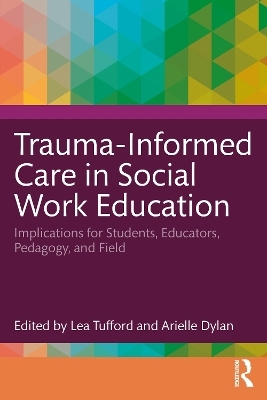
Trauma-Informed Care in Social Work Education
Routledge (Verlag)
978-1-032-31861-5 (ISBN)
- Noch nicht erschienen (ca. März 2025)
- Versandkostenfrei innerhalb Deutschlands
- Auch auf Rechnung
- Verfügbarkeit in der Filiale vor Ort prüfen
- Artikel merken
With contributions from over sixty experts in the field of social work, education, psychology, and counselling, this comprehensive book provides current understandings of how trauma manifests in the lived experience of social work students. The book begins by introducing why trauma-informed care is needed in social work and addresses the reality of historical trauma. Each chapter views the social work student at the center of the educational journey and considers how trauma can shape experiences in various settings such as the classroom, curriculum, field, educational policy and community involvement, and support services. Chapters cover topics such as the neuroscience of trauma, poverty, disability, racism, experiential approaches, online course delivery, climate change, mindfulness, student mental wellbeing, and more.
This handbook is a must-read for social work educators and field instructors who seek to prevent and minimize trauma in their social work pedagogy. It is also beneficial for undergraduate and graduate courses such as child and youth care, addiction services, and foundations of social work.
Lea Tufford, Ph.D., is a professor in the School of Social Work at Laurentian University. Her research interests include social work education, child abuse and neglect, eco-social work, and contemplative practices. Arielle Dylan, Ph.D., is a professor in the School of Social Work at St. Thomas University. Her research interests include spirituality and social work, eco-social work, and contemplative practices in direct practice with individuals and groups.
Part 1: Conceptualizing Trauma 1. A Conceptualization of Trauma for Social Work Education 2. Navigating Trauma: A Prerequisite for Social Work Excellence 3. Understanding the Impact of Trauma on the Human Brain, Relationships, and Learning 4. An Ecological Conceptualization and Healing-Centered Approach to Trauma: Implications for Social Work Education 5. Integrating a Trauma-informed Perspective in the Generalist / Foundation Practice Curriculum 6. Fostering Trauma-informed Relationships in Education: Recognition, Respect and Remembering 7. Trauma-informed Approaches in Embodied Social Work Part 2: Trauma and the Social Work Classroom 8. Special Considerations for Trauma-informed Online Teaching: Implications for Educators 9. Creating Safety and Community in the Classroom: Equipping a New Generation of Social Workers 10. An Integrated Trauma-informed and Anti-oppressive Framework Across Social Work Courses: Curriculum and Classroom Support 11. Spirituality, Trauma, and Healing-Centred Care 12. Promoting Trauma-Informed Practice in Social Work Education Through Experiential Learning Program 13. Trauma-Informed Teaching during Triggering Times: COVID-19, Radical Violence and Revisiting the Importance of Naming Trauma 14. Trauma-informed Pedagogy and Online Social Work Education and Field Instruction 15. Trauma-informed Simulation-based Learning: Considerations for Students and Standardized Clients Part 3: Trauma and the Social Work Curriculum 16. Trauma-informed Teaching of Sensitive Subjects: Strategies for Instructors 17. Social Work Education Curriculum Design: Applying a Feminist Informed Trauma Model 18. Fostering Critical, Reflective, Trauma-informed Social Work Education: A Polyvagal-informed Approach to Pedagogy 19 Black and Indigenous Trauma and Ethics of Care in Neoliberal Registration Part 4: Trauma and Social Work Field Education 20. Trauma and Social Work Field Education: Supporting Students, Instructors, and our Team 21. Trauma and Field Education 22. Preparation, Integration and Practice: A Field Placement Model for Creating Resiliency and Longevity in the Social Workers of Tomorrow Part 5: Promoting Trauma-Informed Care through Educational Policy and Community Involvement and Research 23. Structural Violence, Trauma and the Pursuit of Happiness 24. Homelessness Research and Vicarious Tramatization: Preparing Students for Social Work Research and Practice with Diverse Populations 25. Creating a Trauma-Informed School of Social Work: Curriculum, Policies and Practices, and University-Community Partnerships 26. Universal Design and Trauma-Informed Teaching: Integration, Inclusion, and Social Justice Part 6: Trauma-Support Services for Social Work Students, Staff, and Educators 27.Systemic Self-Care 28. “Let’s Get Physical”: Integrating Trauma-Informed Physical Activity into Social Work Education 29. Relational Impacts: Trauma-related Risk, Protection, Social Work Practice and Education 30. Why Students Enter Social Work: Embracing the “Wounded Healer” Part 7: Concluding Thoughts and Future Directions 31. Summary and Implications
| Erscheint lt. Verlag | 7.3.2025 |
|---|---|
| Zusatzinfo | 4 Tables, black and white; 12 Line drawings, black and white; 5 Halftones, black and white; 17 Illustrations, black and white |
| Verlagsort | London |
| Sprache | englisch |
| Maße | 178 x 254 mm |
| Themenwelt | Medizin / Pharmazie ► Gesundheitswesen |
| Medizin / Pharmazie ► Medizinische Fachgebiete ► Notfallmedizin | |
| Sozialwissenschaften ► Pädagogik ► Sozialpädagogik | |
| Sozialwissenschaften ► Soziologie | |
| ISBN-10 | 1-032-31861-9 / 1032318619 |
| ISBN-13 | 978-1-032-31861-5 / 9781032318615 |
| Zustand | Neuware |
| Haben Sie eine Frage zum Produkt? |
aus dem Bereich


